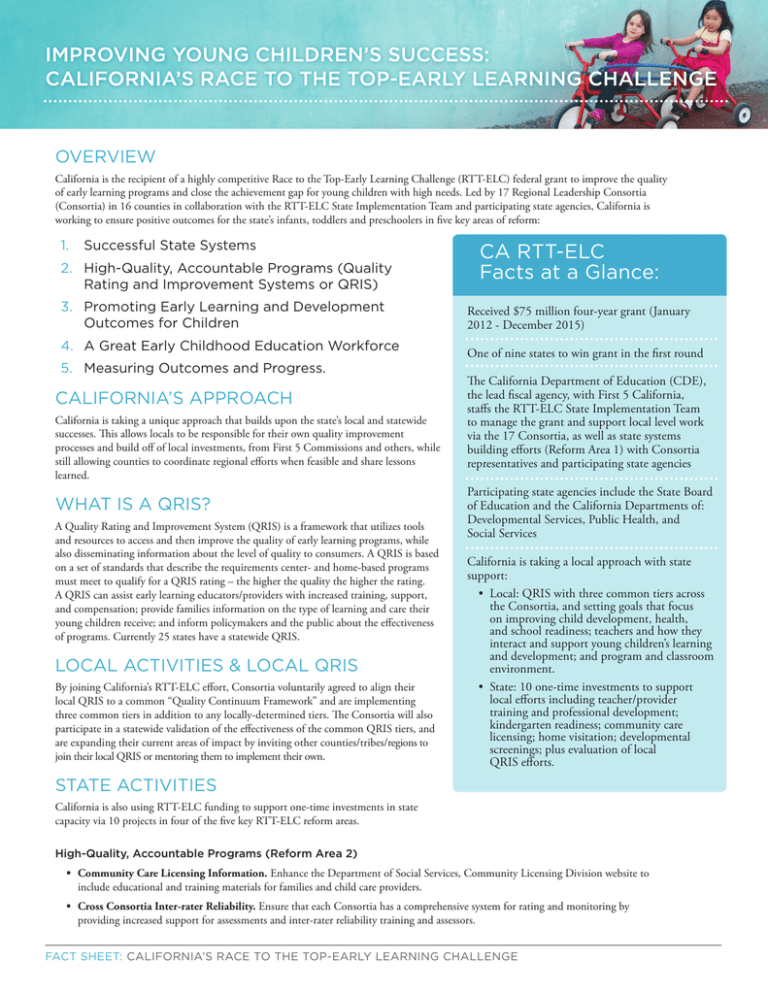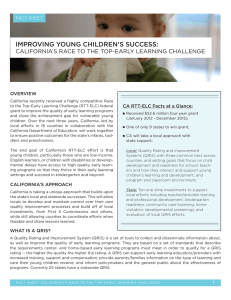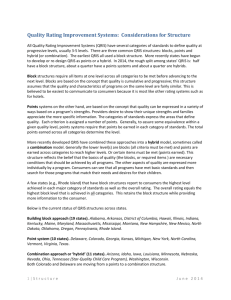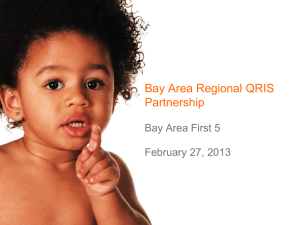RTT-ELC Fact Sheet
advertisement

OVERVIEW California is the recipient of a highly competitive Race to the Top-Early Learning Challenge (RTT-ELC) federal grant to improve the quality of early learning programs and close the achievement gap for young children with high needs. Led by 17 Regional Leadership Consortia (Consortia) in 16 counties in collaboration with the RTT-ELC State Implementation Team and participating state agencies, California is working to ensure positive outcomes for the state’s infants, toddlers and preschoolers in five key areas of reform: 1. Successful State Systems 2. High-Quality, Accountable Programs (Quality Rating and Improvement Systems or QRIS) 3. Promoting Early Learning and Development Outcomes for Children 4. A Great Early Childhood Education Workforce 5. Measuring Outcomes and Progress. CALIFORNIA’S APPROACH California is taking a unique approach that builds upon the state’s local and statewide successes. This allows locals to be responsible for their own quality improvement processes and build off of local investments, from First 5 Commissions and others, while still allowing counties to coordinate regional efforts when feasible and share lessons learned. What is a QRIS? A Quality Rating and Improvement System (QRIS) is a framework that utilizes tools and resources to access and then improve the quality of early learning programs, while also disseminating information about the level of quality to consumers. A QRIS is based on a set of standards that describe the requirements center- and home-based programs must meet to qualify for a QRIS rating – the higher the quality the higher the rating. A QRIS can assist early learning educators/providers with increased training, support, and compensation; provide families information on the type of learning and care their young children receive; and inform policymakers and the public about the effectiveness of programs. Currently 25 states have a statewide QRIS. LOCAL ACTIVITIES & LOCAL QRIS By joining California’s RTT-ELC effort, Consortia voluntarily agreed to align their local QRIS to a common “Quality Continuum Framework” and are implementing three common tiers in addition to any locally-determined tiers. The Consortia will also participate in a statewide validation of the effectiveness of the common QRIS tiers, and are expanding their current areas of impact by inviting other counties/tribes/regions to join their local QRIS or mentoring them to implement their own. CA RTT-ELC Facts at a Glance: Received $75 million four-year grant (January 2012 - December 2015) One of nine states to win grant in the first round The California Department of Education (CDE), the lead fiscal agency, with First 5 California, staffs the RTT-ELC State Implementation Team to manage the grant and support local level work via the 17 Consortia, as well as state systems building efforts (Reform Area 1) with Consortia representatives and participating state agencies Participating state agencies include the State Board of Education and the California Departments of: Developmental Services, Public Health, and Social Services California is taking a local approach with state support: • Local: QRIS with three common tiers across the Consortia, and setting goals that focus on improving child development, health, and school readiness; teachers and how they interact and support young children’s learning and development; and program and classroom environment. • State: 10 one-time investments to support local efforts including teacher/provider training and professional development; kindergarten readiness; community care licensing; home visitation; developmental screenings; plus evaluation of local QRIS efforts. STATE ACTIVITIES California is also using RTT-ELC funding to support one-time investments in state capacity via 10 projects in four of the five key RTT-ELC reform areas. High-Quality, Accountable Programs (Reform Area 2) • Community Care Licensing Information. Enhance the Department of Social Services, Community Licensing Division website to include educational and training materials for families and child care providers. • Cross Consortia Inter-rater Reliability. Ensure that each Consortia has a comprehensive system for rating and monitoring by providing increased support for assessments and inter-rater reliability training and assessors. FACT sheet: california’s race to the top-early learning challenge Promoting Early Learning Development Outcomes for Children (Reform Area 3) • Electronic Training Materials of Existing Content. Develop online training overviews of the Infant/Toddler Learning and Development Foundations and the Preschool Learning Foundations and their respective Frameworks, and of the Environment Rating Scales (ERS). • Screening Tool Training and Distribution. Provide training on and distribution of “Ages and Stages” developmental screening tools to the Consortia for distribution to programs participating in their local QRIS. • California Collaborative for the Social and Emotional Foundations of Early Learning (CCSEFEL). Create a web-based overview of the CCSEFEL teaching pyramid, build a network of regional trainers and coaches, and support implementation of the teaching pyramid in interested sites in the Consortia. • Home Visiting. Provide training to local California Home Visiting Program staff on implementing the Program for Infant/Toddler Care (PITC) practices and on lessons from the “Three R’s of Early Childhood: Relationships, Resilience, and Readiness” DVD. • Personnel Development for Early Start. Provide coordinated training for Early Start early intervention program staff and support implementation of best practices in developmental and health screenings at the local level in collaboration with the Consortia. A Great Early Childhood Education Workforce (Reform Area 4) • Curricula Development for Higher Education. Coordinate unit-based coursework alignment for three child development content areas: infant/toddler; children with special needs; and program administration. • Program Administration Scale (PAS)/Business Administration Scale (BAS) Training. Provide “train-the-trainer” instruction on PAS and BAS tools in order to support administrative technical assistance to participating centers and family child care homes in the Consortia. Measuring Outcomes and Progress (Reform Area 5) • Kindergarten Entry Data. Ensure kindergarten entry assessment data, namely Desired Results Developmental Profile – School Readiness (DRDP-SR) results, can be connected to the California Longitudinal Pupil Achievement Data System (CALPADS). The end goal that unites the Consortia and the state’s one-time investment activities is to ensure that children in California have access to high quality programs so that they thrive in their early learning settings and succeed in kindergarten and beyond. Nearly 77 percent of California’s grant is being spent at the local level in 16 counties to support a voluntary network of 17 Regional Leadership Consortia, each led by an organization that was already operating or developing a QRIS and has allocated additional local resources to the efforts. Alameda: First 5 Alameda San Diego: First 5 San Diego Contra Costa: First 5 Contra Costa San Francisco: First 5 San Francisco El Dorado: First 5 El Dorado San Joaquin: First 5 San Joaquin Fresno: Fresno County Office of Education Santa Barbara: First 5 Santa Barbara Los Angeles: LA STEP & LAUP Santa Clara: First 5 Santa Clara Merced: Merced County Office of Education Santa Cruz: First 5 Santa Cruz Orange: Orange County Office of Education Ventura: First 5 Ventura Sacramento: Sacramento County Office of Education Yolo: First 5 Yolo The number of children under five-years-of-age in these 16 counties is almost 1.9 million, representing 70 percent of the total children birth to five in California. MORE INFORMATION Contact the California Department of Education, Child Development Division at: rtt-elc@cde.ca.gov Visit the California Department of Education RTT-ELC website at: http://www.cde.ca.gov/sp/cd/rt/ Created by in collaboration with the RTT-ELC State Implementation Team. In partnership with: California Child Care Resource & Referral Network, ZERO TO THREE, Advancement Project and Early Edge California. FACT sheet: california’s race to the top-early learning challenge



